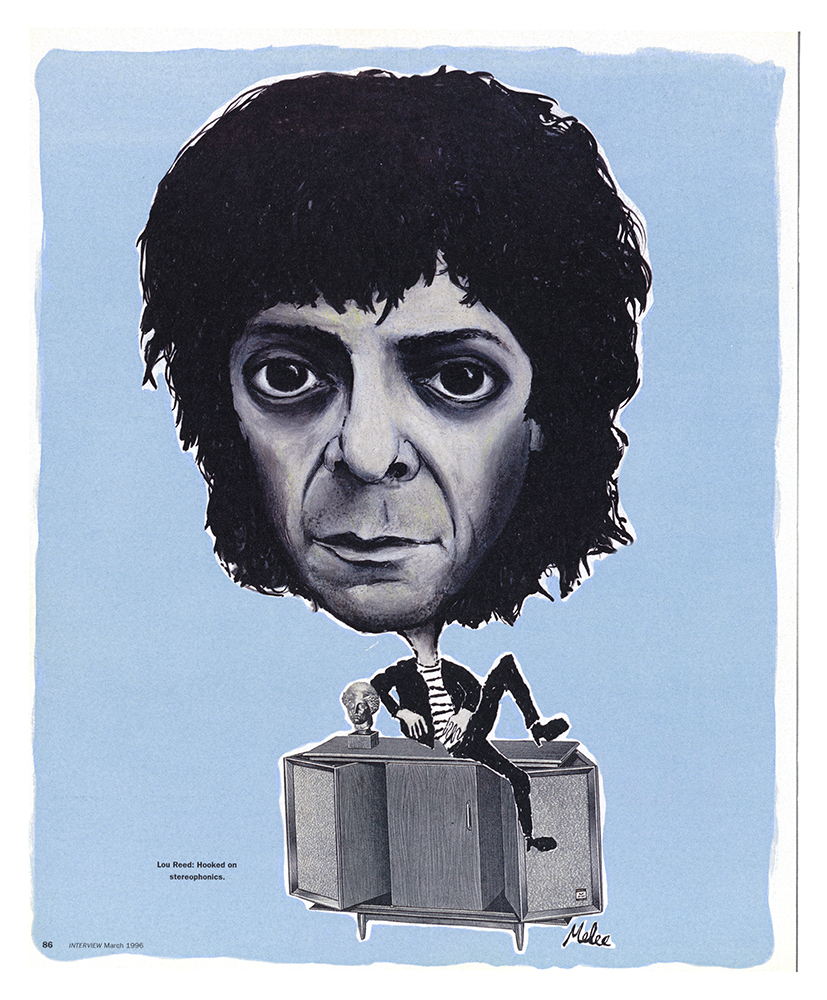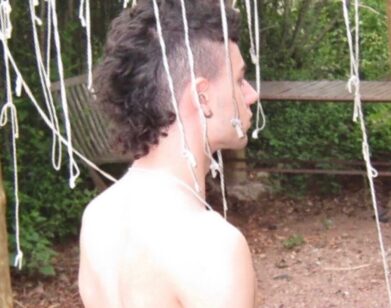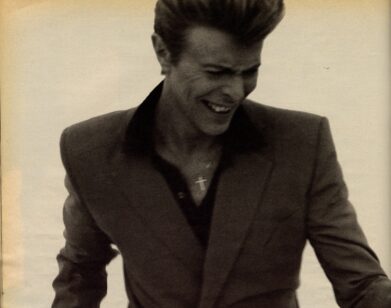Remembering Lou Reed

ABOVE: AN ILLUSTRATION BY ROBERT MELEE OF LOU REED, ORIGINALLY IN THE MARCH 1996 ISSUE OF INTERVIEW
Millions of rock-‘n’-roll-loving hearts simultaneously broke yesterday when the announcement came through that Lou Reed had passed away at 71. A true legend and music pioneer, Reed constantly shattered his own mold, both as the front man of The Velvet Underground and his decades long career as a solo artist. The sense of honesty that permeated his lyrics and his always-evolving sound made the artist a hero not only to his legions of fans but also to the countless music greats who felt his influence.
When Reed, along with John Cale, Sterling Morrison, and Maureen Tucker, formed The Velvet Underground in 1965, it wasn’t long before they caught the attention of our founder, Andy Warhol. Though the group was never particularly successful in terms of record sales, Rolling Stone declared its debut, The Velvet Underground and Nico, the 13th greatest album of all time. Reed left the group in 1970 and went on to enjoy a successful and characteristically unpredictable solo career. Never one to give much weight to the opinion of critics, Reed was a fearless individualist. “He’s really not placating anything or anyone. He is a hundred percent Lou,” Metallica’s James Hetfield told us in 2011.
The loss felt by the music community is evident in the statements released by Reed’s friends and collaborators. Cale tweeted, “The world has lost a fine songwriter and poet… I’ve lost my ‘school-yard buddy.'” The Pixies, David Bowie, Morrissey and countless others have released similarly moving statements.
We, too, wanted to pay tribute to the late, great Lou Reed. So we dug through the archives to uncover some memorable musings from his many appearances on the pages of Interview. —Allyson Shiffman
KIDS AND GRAFFITI: I’d let ’em loose on the whole city. ‘Cause there are some great sections of the city that are dumps, where they have drawn in whole sides of buildings, and colored all the garbage and debris in the yards. It looks fabulous. [Lou Reed: A Subway to the Stars, March 1973]
HIS AUDIENCE: The glitter people know where I’m at. The gay people know where I’m at. Straight people may not know where I’m at, but they find it kind of interesting when they show up and see what is sitting around them. It’s interesting to have a conglomeration of people that covers the strata from A to Z… There’s a certain element of the audience that’s intellectually oriented, into the lyrics… then there’s another element of the audience that’s into a sex trip. I’m into both of them. [Lou Reed: A Subway to the Stars, March 1973]
MILWAUKEE GLITTER PEOPLE: We did Milwaukee, man, unbelievable. The gay kids were goin’ crazy. All the glitter queens were out—a typical audience that I would pull. Later on I did some investigating. It turns out that there are clubs [for the LGBT community], almost nobody knows about ’em, but they came out for the show, freaking out a lot of other people who just showed up for a rock show. People didn’t know they were there, but they are there. [Lou Reed: A Subway to the Stars, March 1973]
BIG VS. SMALL SHOWS: They’re two different trips, psychologically different. You can get off on both of them. I don’t think it’s a matter of preference. It’s fun to be in a small club and to be able to look somebody right in the eye and watch them just freak. Then it’s fun to be in front of thousands of people and watch a couple of hundred freaking out of their minds. [Lou Reed: A Subway to the Stars, March 1973]
WHEN “TEMPORARY THING” PLAYS: Alllllright! Dig the piano, my man. He’s hitting the piano hard enough to kill four electricians. It’s fucking inexorable. It’s just a temporary thing and I don’t give two shits. We’re going to hear that one again since it bears study and investigation. In fact I hear, and it may be official, that it is in 13/8 time, very unique, esoteric, Ukrainian time signature. [Lou Reed: Rock and Roll, Heart to Heart, December 1976]
CREATING LYRICS: “The Chooser and the Chosen One.” It ain’t got words. It’s an instrumental. [singing] The chooser and the chosen one. You can’t be a chooser if you’re the chosen one. But if you’re the chosen one, you’re lucky enough to have a chooser, ba bum-bum barra, ba bum-bum barra. Choose choose choose… [talking] I’m making them up. That’s what I did with the rest of the record. [Lou Reed: Rock and Roll, Heart to Heart, December 1976]
VELVET UNDERGROUND IN AMERICA: I think that Europeans are more appreciative of our culture than [Americans] seems to be. The Velvet Underground have been nominated three times for the Rock and Roll Hall of Fame, and three times we haven’t been put in… [A Walk on the Riled Side, April 1994]
BUT THEN THEY WERE INDUCTED: I wish it had taken place while Sterling [Morrison] was still alive. That’s the major thing. I think it’s a vindication, for us and for Andy, for those who believed in us and thought what we were doing was worthwhile. [Lou Reed, March 1996]
AGE 53 AND SET THE TWILIGHT REELING: I’m eating healthier, that’s for sure. That’s one way of looking at it. But another way is that [the ’60s and ’70s] were just the times, and I was younger. I don’t think I would say my earlier work had negative energy. There were incredibly beautiful, positive songs on the albums right from the beginning. “I’ll be Your Mirror” is a very beautiful song. So is “Pale Blue Eyes.” Some rock is rock, you know, like “Sister Ray” or “White Light/White Heat.” But I wouldn’t call that negative, geez. I just thought of it as super-fun. Wow. Power, real visceral action. I certainly feel better about life [now] than I’ve ever felt. Having control has made me feel really good. [Lou Reed, March 1996]
THE GUITAR: People have stringed things to whack at forever. I’ve always thought that rock-‘n’-roll reminded me of those medieval bands that went from town to town, and they’d put on a play. Rock-‘n’-roll bands do that—they just need electricity. You know, you can’t transport a piano around to a party. A banjo doesn’t have any power. No one gives a shit about the harp. A violin is kind of interesting, but you have to know how to play it. A guitar, any fool can play. [Lou Reed, March 1996]
REMEMBERING HIS MENTOR: I think about Andy [Warhol’s] philosophy: “Work, work, work. Stay on top of it. You’re lazy; what’s wrong with you?” He would just say that over and over and over, like a broken record. “You’re so lazy! You should be writing 15 songs a day.” He was so smart. So fucking smart, and so funny. Andy said things to me that would just stop me dead. Boy, you don’t come across that very often, and boy, I wish I did. It gets lonely. [Lou Reed, March 1996]
ON POLITICS: To debate political objectives, views, and goals is the most American thing conceivable. And those people [right-wing conservatives] are despicable. They are traitors to the democratic ideal. They are disgusting. It’s right to make fun of them, and this [“Sex With Your Parents”] is gentle fun. [Lou Reed, March 1996]
ANDY WARHOL LIKING HIS MUSIC: It just seemed to be something that augmented him, that went along with him, that he responded to positively. It was really up his alley—if he had such a thing as an alley. It’s crazy if you think about it. There must have been a billion bands in New York at that time, and we [The Velvet Underground] just happened to get along over there, and we loved him, and I think he reciprocated that feeling. There’s got to be a reason why these things occurred around Andy to such a degree and not around someone else at that time in New York City. He had this incredible ability to make things happen and to get ideas out of people. These were sometimes perfectly obvious ideas, but they didn’t exist much before Andy. [Lou Reed: Focus, Thy Name is Lou, May 1998]
“HEROIN:” The song has been accused of romanticizing heroin, but it’s not a pro-heroin song. On the other hand, it’s not an anti-heroin song either—it’s just about heroin. [Lou Reed: Focus, Thy Name is Lou, May 1998]
BEING A ROLE MODEL: Since when is whatever we do something that someone younger can listen to and emulate safely? Since when does everything have to be a role model? One thing I’ve often thought is that I never want to tell anybody else what to do. It’s hard enough to figure out what I want to do. [laughs] [Lou Reed: Focus, Thy Name is Lou, May 1998]
PURITY: I myself would be scared to use it to describe my work because I’d be afraid of sounding pretentious. On the other hand —without getting into a discussion about what purity is—that is so much what I aspire to, for better or for worse. [Lou Reed: Focus, Thy Name is Lou, May 1998]
WHAT MUSIC IS: You know, music is an amazing thing. I don’t know if we really think about it the same way we consider a painting an amazing thing. I mean, a painting is, in quotes, imaginary. There is nothing on the canvas when you start; and writing a song, there is nothing there when you start. You make a song and you sing it and you bring in friends to play it with you and it becomes music—and what is music? What is this string of notes that when you do them a certain way and put certain words to them can move another person? [Lou Reed: Lou-Poe, April 2000]
HIS “THING”: My primary thing has always been to spark an emotion in the listener than they might not be prepared for. [Lou Reed: Lou-Poe, April 2000]
ROCK AND ROLL: I’ve been a fan of rock—all kinds of rock—forever. But I never remember the name of anybody—except maybe Al Green. [Lou Reed: Loutallica, November 2011]
METALLICA: They were just even greater than I thought they were. These are my soul brothers. They are my spirit brothers. They are my metal brothers. There’s no ifs, ands, or buts about it. Every time we’re there, there it is. Every time I listen to the record, I pray to God I was so lucky to meet these guys. [Lou Reed: Loutallica, November 2011]
LOOKING BACK: When I’m older, I don’t want to think. [laughs] [Lou Reed: Loutallica, November 2011]






